How to Report Short-Term Rental Income
Learn how to report Short-Term Rental income with expert advice on our blog. Discover essential tips and guidelines for accurate reporting.
July 24, 2024
Banjamin

Key Highlights
- Renting out your property for short stays can provide extra income, it's important to understand the tax requirements.
- The IRS defines a Short-Term Rental as a rental property that is rented out for an average period of fewer than 30 days.
- If you rent property for less than 15 days in a calendar year, the income is not required to be reported for income tax purposes.
- If you have a Short-Term Rental business and rent your property multiple times during the year, amounting to more than 15 days, you'll need to report the income and expenses on your business’ tax return.
- Understanding the different tax forms, deductions, and local tax obligations is essential for Short-Term Rental owners and property managers to maximize profits and stay compliant with the law
Are You Paying Too Much? Strategies for how to report Short-Term Rental Income

Considering dipping your toes into the world of Short-Term Rentals?
Before you open your doors to guests, it’s crucial to understand the tax implications involved. Reporting your Short-Term Rental income correctly is not only a legal obligation but can also optimize your tax liabilities. From navigating Schedule E to maximizing deductions, this guide will walk you through the essential tax considerations for Short-Term Rental owners. Let’s ensure you’re on the right track from the get-go!
Understanding Short-Term Rental Income Tax Requirements
For those diving into the world of Short-Term Rental income, understanding the tax requirements is crucial. The IRS defines Short-Term Rentals differently and distinguishes between personal and rental use. Knowing where to report your income, whether on Schedule E or Schedule C and grasping the significance of Form 1099-K can simplify your tax return process. Stay informed about deductible expenses, depreciation calculations, and the impact of local and state taxes on your rental business. Take proactive steps in managing your taxes to make the most of your rental income.
Defining Short-Term Rentals According to the IRS
Short-Term Rentals, as defined by the IRS, refer to properties rented out for an average period of fewer than 30 days. These include vacation rentals, Airbnb properties, and any dwelling unit used by guests for a short stay. The rental days are limited compared to long-term rentals, making them popular for generating extra income through multiple short-term stays. Understanding this distinction is crucial for accurate tax reporting and compliance with IRS regulations. Ensuring proper documentation of rental activities is essential for tax preparation and minimizing potential tax issues.
Key Differences Between Personal and Rental Use
Understanding the key differences between personal and rental use is crucial for managing your Short-Term Rental income. Personal use refers to any time you occupy the property yourself, while rental use involves renting it out to guests. The distinction is vital for tax purposes as it impacts what expenses you can deduct and how you report your income. By keeping clear records of personal and rental days, you can navigate the tax implications effectively and maximize your profits. Planning ahead, and understanding regulations, are key to operating a successful Short-Term Rental business.
Essential Tax Forms for a Short-Term Rental Business
Reporting Short-Term Rental income requires specific tax forms. Rental owners must navigate between Schedule E and Schedule C to accurately report earnings. Additionally, Form 1099-K plays a crucial role in detailing income. Understanding and correctly filling out these forms ensures compliance with tax laws and helps maximize your deductions.
Property managers should be able to provide the breakdown of their Short-Term Rental (STR) income and expenses throughout the year. This information is crucial to accurately report rental income and claim any applicable deductions on tax returns. Remember, proper documentation is essential when dealing with rental income to avoid any potential issues with the tax authorities.
It is important to consult with a tax professional to understand how your specific situation affects your tax filing requirements. They can help you interpret the information provided by your property manager and ensure you're reporting your STR income correctly.
Schedule E vs. Schedule C: Where to Report Your Income

When declaring your Short-Term Rental income, deciding whether to use Schedule E or Schedule C is crucial. Schedule E is typically used for rental income reporting, while Schedule C is for reporting income from a business you actively participate in, like a Short-Term Rental business. If you're primarily renting out a property with minimal services provided, you'd likely use Schedule E. However, if you're offering extensive services akin to a hotel, Schedule C might be more appropriate. Understanding the distinction helps you accurately report your income for tax purposes. Always remember to consult with your local authorities and tax professionals when confirming how to report your finances to the IRS.
Form 1099-K: Understanding Its Importance
When it comes to reporting your Short-Term Rental income, understanding Form 1099-K is crucial. It ensures transparency and compliance with tax regulations. By familiarizing yourself with Form 1099-K and its significance, you can accurately report your rental income and avoid any discrepancies with the IRS. Stay informed of the policy changes related to STRs in your area to streamline your tax filing process and ensure accuracy in your filings.
Common Tax Deductions for Short-Term Rentals
As a Short-Term Rental owner, maximizing tax deductions is crucial. Common deductions include property taxes, mortgage interest, maintenance costs, and utilities. These expenses directly related to your rental business can significantly reduce your taxable rental income. Additionally, expenses for advertising, cleaning services, and property management fees are also deductible. By keeping detailed records of all these expenses, you can lower your tax liability and optimize the financial performance of your Short-Term Rental property.
Deductible Expenses: What Can You Write Off?
Discover what expenses can be deducted as STR property manager. Common deductions include maintenance, utilities, insurance, cleaning fees, and property management costs. Understanding deductible expenses is key to maximizing your tax benefits.
Depreciation: How to Calculate It for Your Rental
Depreciation is a crucial aspect of managing rental properties. To calculate it for your rental, you need to determine the property's cost, land value, and useful life.The calculated depreciation amount can be deducted as an expense on your tax return, reducing your overall tax liability. Keeping meticulous records of depreciation is key to maximizing your deductions and ensuring compliance with tax laws.
The Impact of Local, State, and Federal Taxes on Short-Term Rentals
Navigating local tax obligations and understanding state and federal tax requirements are crucial for Short-Term Rental owners. Local taxes, such as occupancy or rental property taxes, can directly affect your bottom line. State tax laws vary, affecting your overall tax liability. Staying compliant with these tax authorities is essential for smooth operations. By understanding the regulations, consulting a tax professional, and maintaining good records, you can ensure a smooth tax season and maximize your profits.
Navigating Local Tax Obligations
When it comes to managing your Short-Term Rental, understanding local tax obligations is crucial. Different areas have varying tax rules that can significantly impact your tax liability. Make sure to research and comply with any occupancy or rental taxes that may apply to your STR property. Keeping detailed records of rental periods and income can help streamline your tax preparation process. By staying informed about local tax laws, you can ensure a smooth financial operation for your rental business.
State Tax Requirements: What You Need to Know
When considering Short-Term Rental taxation, understanding state tax requirements is crucial. Each state has its own set of regulations governing rental income. It's essential to be aware of tax laws specific to your location. To determine your specific local tax obligations, check with your city or county government's website, or consult with an industry specific tax expert. These resources should have information on occupancy taxes, licensing requirements, and any other relevant regulations. Familiarize yourself with any state-specific forms or documentation needed when reporting your rental income. Comprehending these requirements will help you fulfill your tax obligations accurately and avoid potential penalties. Stay informed and consult with tax experts if necessary to navigate state tax regulations effectively.
Federal Tax STR Requirement: Understanding the 14-Day Rule and Its Exceptions
The 14-day rule is an important consideration for Short-Term Rental owners when it comes to reporting rental income. Here's a closer look at the 14-day rule and its exceptions:
- If you rent out your property for less than 15 days, the income from these days is not required to be reported for income tax purposes. Be sure to confirm this with your specific jurisdiction as these rules change often.
- However, if you exceed 14 total rental days in a year, the IRS considers the property a rental, and you need to report your rental income and expenses on your tax return.
- Exceptions to the 14-day rule include personal use of the property. If you use your property for personal use for more than 14 days or more than 10% of the days the property is rented at fair rental value, you must allocate rental and personal use expenses accordingly.
Strategies for Maximizing Your Short-Term Rental Profit
One key strategy for maximizing your Short-Term Rental profit is to implement dynamic pricing. By adjusting your rates based on demand, seasonality, and/or local events, you can optimize your business and increase your net income. Additionally, offering add-on services or experiences can attract more guests and increase your earnings. To stand out in a competitive market, focusing on excellent guest communication and service is crucial. Engaging with guests promptly and ensuring a delightful stay can lead to positive reviews, repeat bookings, and ultimately higher profits.
Pricing Strategies for Peak and Off-Peak Seasons

During peak seasons, demand for Short-Term Rentals is typically higher, which allows you to charge higher rental rates. To maximize your earnings during peak seasons, you can implement dynamic pricing strategies. Here are some pricing strategies for both peak and off-peak seasons:
Peak Season Pricing:
- Set higher rental rates during peak seasons when demand is high.
- Consider offering special packages or discounts for longer stays to attract more guests.
- Adjust your rates based on local events and holidays that may increase demand for Short-Term Rentals.
Off-Peak Season Pricing:
- Lower your rental rates during off-peak seasons to attract guests and maintain a steady occupancy rate.
- Offer discounted rates for extended stays or for bookings during the weekdays.
- Consider providing additional incentives or amenities to make your property more appealing during the off-peak season.
Cost-Saving Tips for Managing Short-Term Rental Business
As a property manager, it is important to find ways to save costs and increase your profitability. Here are some cost-saving tips for your STR business:
- Automate tasks: Save time and money by automating tasks such as guest communication, booking management, and cleaning schedules using software or apps specifically designed for Short-Term Rentals
- Energy-efficient upgrades: Invest in energy-efficient appliances, lighting, and insulation to reduce utility costs and appeal to environmentally-conscious guests.
- Bulk purchasing: Buy supplies and amenities in bulk to take advantage of discounts and lower per-unit costs.
- Additional income streams: Explore additional income opportunities by offering additional services or amenities, such as airport transportation, guided tours, or in-house dining experiences. Further, if there is a need in the area for the space to be used for other purposes, like group pictures or movie filming, be sure to explore these opportunities, especially during off-peak seasons.
Record Keeping and Financial Management for Short-Term Rentals
Effective financial management is crucial for successful Short-Term Rental operations. Maintaining meticulous records of your rental income and expenses simplifies tax preparation and provides valuable insights to optimize your financial performance. Here are some best practices for record-keeping and financial management:
- Keep detailed records of rental income, including rental dates, rates, and payment methods.
- Maintain separate bank accounts for your owner's funds and business transactions to streamline trust accounting and overall financial management.
- Retain receipts and invoices for all rental-related expenses, such as cleaning supplies, maintenance, repairs, and advertising.
- Use STR-specific financial accounting software to track and categorize your rental income and expenses.
- Consult with a tax professional to ensure that you are properly reporting your rental income and taking advantage of all available deductions.
Best Practices for Organizing Receipts and Documents

Organizing receipts and documents is crucial for Short-Term Rental owners to stay on top of their finances and prevent any potential tax issues. Here are some best practices for organizing receipts and documents:
- Create a dedicated folder or digital folder for each rental property to store all related receipts and documents. Clearing can also implement this for you in their centralized receipt/document hub.
- Label receipts and documents with relevant information, such as the date, description of the expense, and the property it is associated with. Set up automation rules for categorization and allocations related to these receipts.
- Keep a separate folder for annual tax-related documents, such as 1099 forms and tax return filings.
- Digitize receipts and documents using scanning apps, like the one built into Clearing, to reduce clutter and facilitate easier access and retrieval.
- Regularly review and reconcile receipts and documents with your financial records to ensure accuracy and identify any discrepancies.
Tools and Software for Managing Short-Term Rental Finances
Managing STR finances can be made easier and more efficient with the help of specialized tools and software. Here are some popular tools and software options for managing Short-Term Rental finances:
- Accounting software: Use accounting software like Clearing to track rental income and expenses, generate financial reports, and streamline tax preparation.
- Property management software: Implement property management software that can assist with tasks like tenant screening, lease management, and rent collection, providing management solutions for Short-Term Rental property managers.
- Expense tracking apps: Apps like Clearing’s mobile app allow you to easily track expenses, categorize rental expenses, scan receipts, and match receipts with transactions.
- Payment processing platforms: Payment processing platforms like Stripe enable you to accept online payments from guests and automate rent collection. Industry-specific tools such as VacationRentPayment, or Lynnbrook Group are also excellent candidates for payment processing.
- Channel management software: Channel management software like Rentals United or NextPax can help you manage multiple booking platforms and synchronize availability and pricing across different channels.
Avoiding Common Pitfalls in Short-Term Rental Taxation
Navigating the tax rules and regulations for Short-Term Rentals can be complex, and falling into common pitfalls can result in costly penalties and fees. Here are some common pitfalls to avoid in Short-Term Rental taxation:
- Misclassification: Be aware of the distinction between a personal use property and a rental property, as misclassification can lead to incorrect reporting and potential tax issues.
- Ignoring the 14-day rule: If you exceed 14 total rental days in a year, make sure to report your rental income and expenses correctly, even if you didn't receive a Form 1099-K from the rental platform.
- Failing to keep proper records: Good record keeping is essential for accurate tax reporting, so make sure to organize and retain all relevant receipts and documents.
- Overlooking available deductions: Take advantage of all eligible deductions to lower your tax liability and maximize your profitability.
Misclassifications That Could Cost You
Misclassifying your Short-Term Rental property can have serious consequences when it comes to tax liability. Here are some misclassifications to avoid:
- Incorrect personal use classification: If you incorrectly classify your property as a personal use property rather than a rental property, you may miss out on eligible deductions and incur penalties for underreporting income.
- Misclassification of rental days: Failing to accurately track and report the number of rental days can lead to misclassification of your property and potential tax issues.
- Failure to meet material participation tests: If you provide substantial services to your guests and fail to meet the material participation tests, you may not be able to deduct certain rental expenses from your other income.
To avoid these misclassifications, it's essential to understand the tax rules and regulations for Short-Term Rentals, consult with a tax professional, and maintain accurate records of your rental activity.
Stay Compliant, Maximize Profits: Your STR Tax Takeaway

Understanding the tax requirements and maximizing profits from your Short-Term Rental income is crucial for financial success. Be sure to stay organized, leverage deductible expenses, and be mindful of local and state tax obligations. By implementing pricing strategies, cost-saving tips, and utilizing tools for financial management, you can optimize your rental business reporting. Avoid common pitfalls, such as misclassifications. Stay informed, keep accurate records, and seek professional advice when needed to navigate the complexities of Short-Term Rental taxation effectively.
Don't wait until tax season - Get the knowledge you need now!
Clearing is a Financial Technology Company, not a bank.




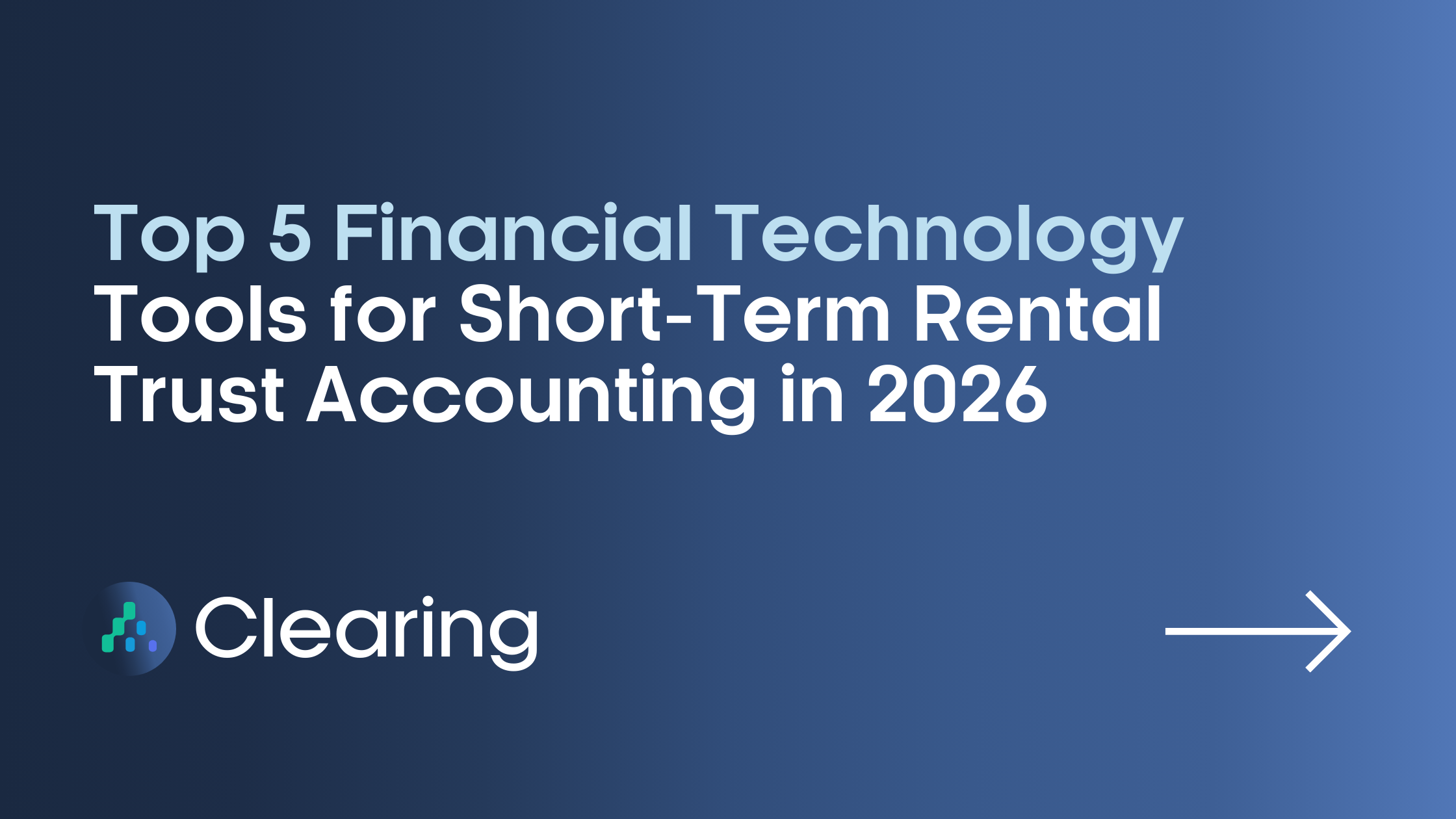
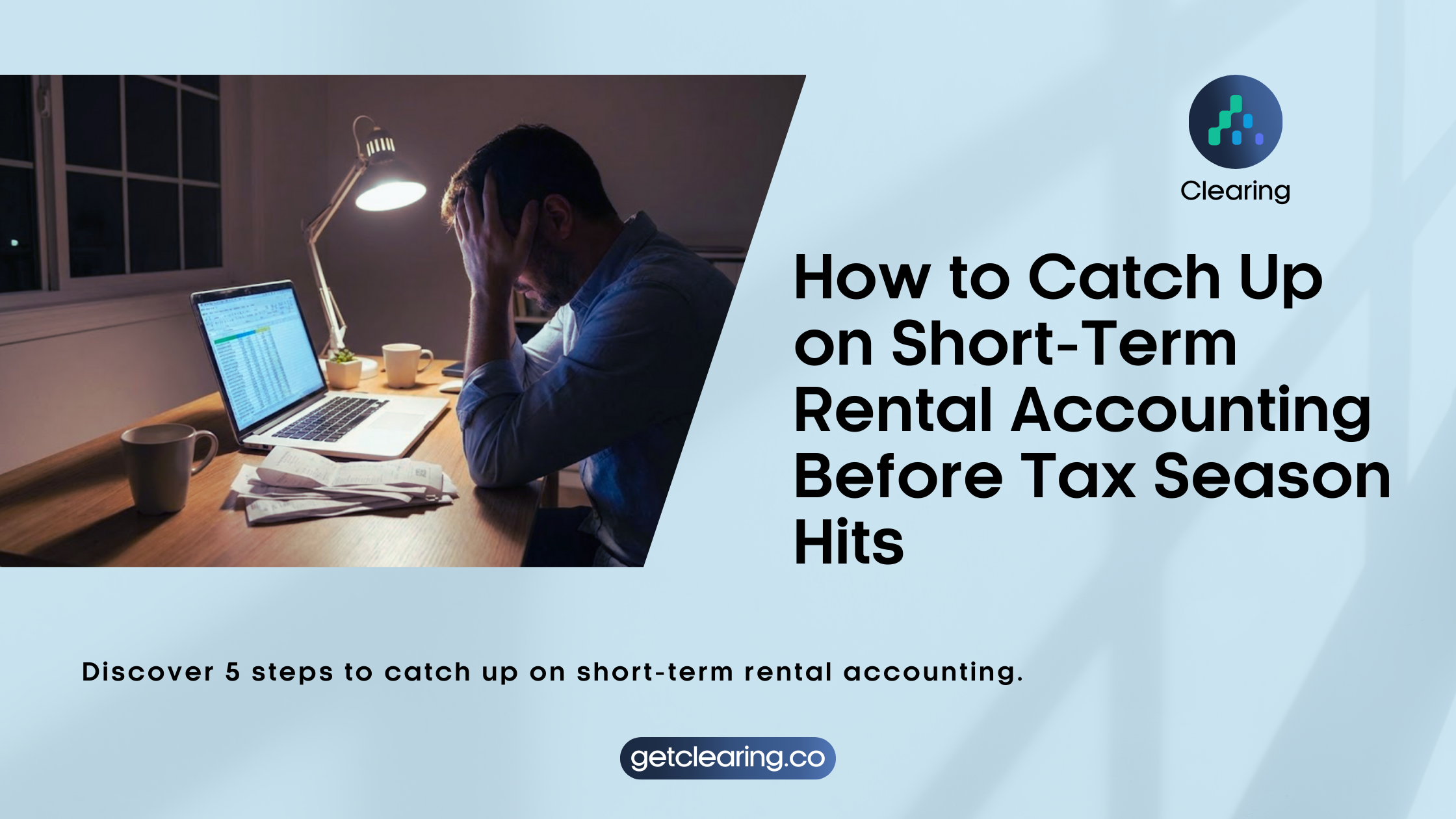
.png)
.png)
.png)
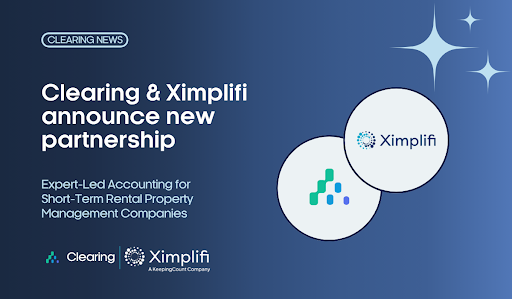
.png)
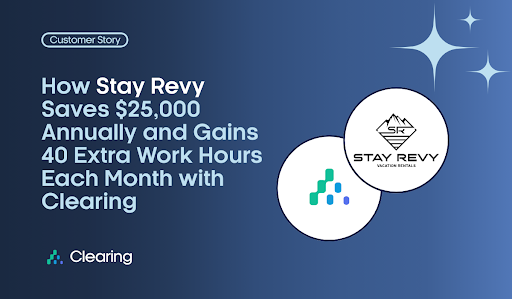
.png)
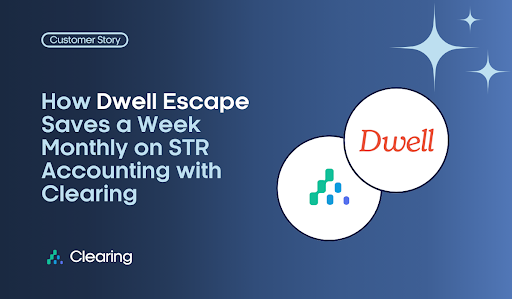
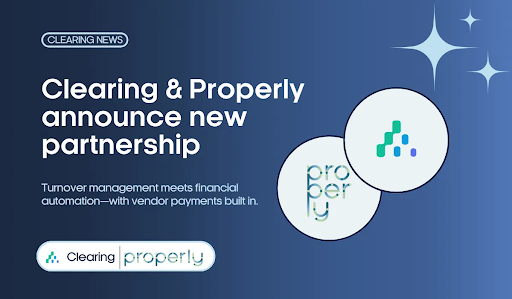
.png)
.png)
.png)
%20(1).png)
%20(1).png)
%20(1).png)
.png)
%20(2).png)
%20(1).png)
%20(1).png)
.png)

.png)
.png)
.png)
%20(1).png)
.png)
.png)
.png)
.png)
.png)
.png)
.png)
%20(1).png)
.png)
.png)
.png)
%20(1).png)
%20(1).png)
%20(1).png)







.jpg)
%20(1).png)
%20(1).png)
%20(2).png)
%20(1).png)

%20(1).png)
%20(1).png)
%20(1).png)



%20(1).png)
%20(1).png)
%20(1).png)
%20(1).png)
%20(1).png)


%20(1).png)
%20(1).png)
%20(1).png)
%20(2).png)
%20(2).png)



%20(2).png)


%20(2).png)
%20(1).png)
.png)


%20(2).png)
%20(2).png)

.jpg)
.png)
.png)
.png)



.png)

.png)